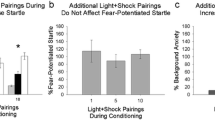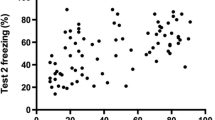Abstract.
Rationale: Pre-clinical and clinical investigations have provided a great deal of evidence that the fear-potentiated startle paradigm represents a valid model for the objective assessment of emotional states of anxiety and fear. Objective: The four studies presented in this report sought to further validate the "threat of shock" paradigm as a human analogue to fear-potentiated startle in rats, by examining the effect of benzodiazepine administration on both baseline and fear-potentiated startle. Methods: Three studies, conducted at Utrecht University, evaluated the effects of oxazepam and of diazepam on baseline and fear-potentiated startle, whereas a fourth study, conducted at Yale University, evaluated the effect of diazepam on baseline, contextual and cue-specific fear-potentiated startle. The threat of shock paradigm consisted of verbal instruction about two visual cues (the threat cue predicted the possible administration of electric shock, the other predicted a safe period), followed by a series of presentations of these cues. During these conditions, acoustic startle stimuli were presented in order to elicit startle responses. The magnitude of the startle response was used to index the degree of fear or alarm experienced during the periods of threat and safety. The fourth study examined the effect of IV administration of diazepam in a similar threat of shock paradigm except that there were two additional context manipulations: electrode placement and darkness. Results: None of the drug manipulations affected specific threat-cue potentiation of startle. However, reductions in baseline startle were observed. Further, startle potentiation by darkness was inhibited by diazepam. Conclusions: At least one type of fear-potentiated startle, i.e. potentiation by a cue-specific fear manipulation, is not susceptible to benzodiazepine treatment. In contrast, effects of manipulations more akin to anxiety (darkness, context) appear sensitive to benzodiazepines. Human experimental models differentiating between these cue specific and contextual responses are needed to shed more light on differences in the anatomy and pharmacology of anxiety disorders.
Similar content being viewed by others
Author information
Authors and Affiliations
Additional information
Electronic Publication
Rights and permissions
About this article
Cite this article
Baas, J.M., Grillon, C., Böcker, K.B. et al. Benzodiazepines have no effect on fear-potentiated startle in humans. Psychopharmacology 161, 233–247 (2002). https://doi.org/10.1007/s00213-002-1011-8
Received:
Accepted:
Issue Date:
DOI: https://doi.org/10.1007/s00213-002-1011-8




